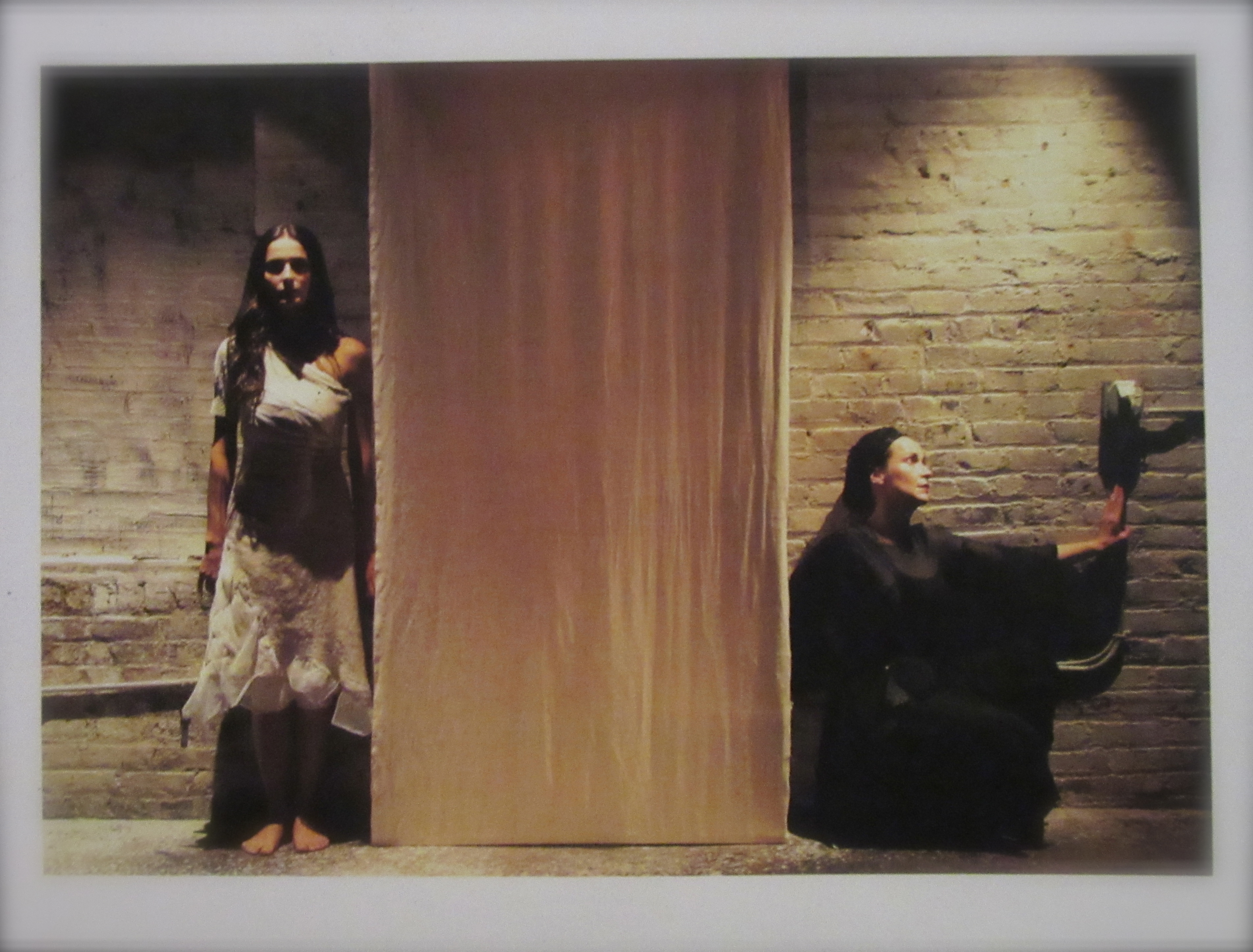A lot of theater happens because its creators have something to say. But New York’s Blessed Unrest has something to tell. To see them is an act of devotion to the significance of storytelling, psychological, aesthetic, and ideological, and the pleasure to be had from it. They enact not just the allure of the tale but its epistemology, asking what, that is, can be known about it, or not, and how. It is, in fact, the mystery of the tale that pulls us to it, and creates its allure. That they – under their director Jessica Burr – have an long standing association with Teatri ODA of Kosova, from a part of the world that is one of cradles of storytelling, is a story in itself.
DORUNTINE, the collaboration now in revival, begins with the telling of that story, of how Burr stumbled upon ODA in a basement theater in the Balkans, and what came after, a tale that is interrupted by the entry of the actors. As it must be: for is not the quintessential story the one lodged inside of other ones, tales within tales, petals pulled one by one from the pistil and stamen of the knowable? What, its tellers seem to ask, is the truth of DORUNTINE, told in two languages by the persons who are in it, and who are themselves doubled: there is a Doruntine and a Doruntina, a Constantine and a Konstantini. The tellers of the tale demand of themselves again and again what it is that is true, or not, in its telling.
Stories tell of what might not have happened, and perhaps couldn’t have, but did anyway. In this case it is a brother killed with all his other brothers in war, who, despite that, brings to his mother the sister, married to a distant husband, that he promised to return to her at the end of her life. It is a mystery how this could happen, but there is a sense that it has to, regardless of physical law or metaphysical restriction, out of moral necessity. A promise was made and had to be kept, if only in the world of story. A tale is told that it be made real in the mind of the hearer. The physical theater of Blessed Unrest carries it a step further, bringing it partway into the material world, not through naturalistic enactment, but with a visual telling.
Burr and her co-director Florent Mehmeti set the tale, scripted by Lirak Çelaj and Matt Opatrny, in a world of memory out of which emerge figures draped mostly in a white that contrasts with the black of mourning. They emerge, but retreat as well, torches reabsorbed by the night. Events shift in and out of comprehension, between past and present, promise and fulfillment, life and death, knowledge and uncertainty, English and Albanian, the subsistent and the enacted. DORUNTINE moves in a netherworld where what is known is never final, but variable in its details from teller to teller.
Tatyana Kot, indomitably present as the Daughter-in-Law to the Lady Mother, initiates the telling, and Nëntor Fetiu as her Nephew serves as a kind of interrogator, teasing out the facts and necessities of the tale. It is the Mother of Doruntine/Doruntina around whom DORUNTINE, despite its title, is centered. In the role, Ilire Çelaj has perhaps the most powerful moment, snared at the literal center of the stage in the black streamers that represent her dead sons, her daughter yet to be returned.
The ODA-Blessed Unrest production feels mythic and trans-historical, but is not without its politics. A story in which the sons and brothers of a family are killed in war can’t help but evoke the history of the Balkans, and the equality of the players suggests a democratic ideal. As in Blessed Unrest’s 2013 retelling of the Eurydice myth, a critique of the U.S. role in the world is hinted at, both positive and negative. The husband who takes Doruntine/Doruntina to her faraway marriage, played by Nathan Richard Wagner and spoken, if I recall correctly, entirely in English, is distinctly North American. The multi-nationality of the experience is added to by the ethnic variety of the New-York contingent. The hip modernity of Poppy Liu, as Doruntine, reframes the dark allure of Njomëza Ibraj Fetiu as Doruntina, her Kosavar counterpart. Kevin Chu and Eshref Durmishi as Constantine/Konstantini are similarly contrasting, in voice and physical bearing.
DORUNTINE tells an ancient tale in sound and image as elusive as dreams, its one obligation that the oath of the son to the mother be met. Yet it is also about the interaction of peoples and their responsibility to each other irrespective of family or nationality. It is striking how easily the dialogue shifts between English and Albanian and how much sense is carried by the latter (and I assume the former) even if it is neither spoken nor understood, as vocabulary, by the listener. Physical theater encompasses the aural as well as the visual: words have sound as well as sense, a music that, whether or not it could be called a universal language, transcends the particular. Perhaps Burr and Mehmeti’s subtlest achievement is that in telling a story from a specific culture they have made it, on multiple levels, both one and many.
For more on Blessed Unrest, click here.
